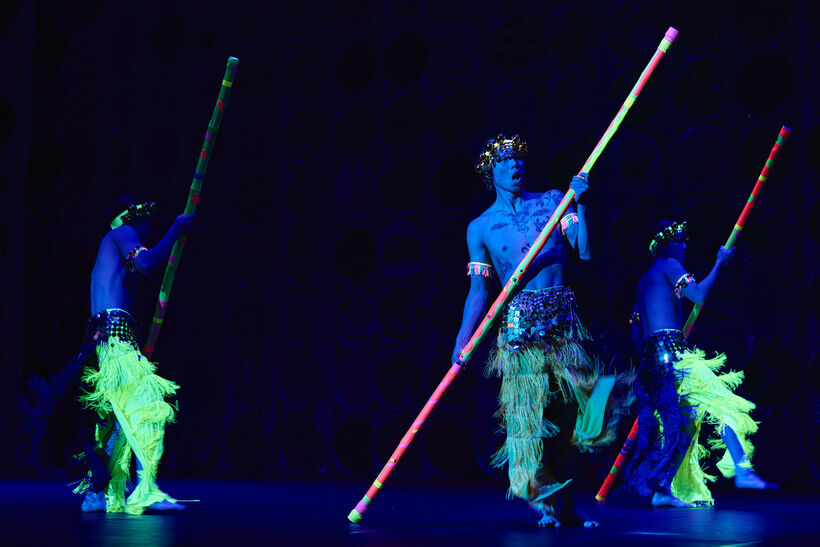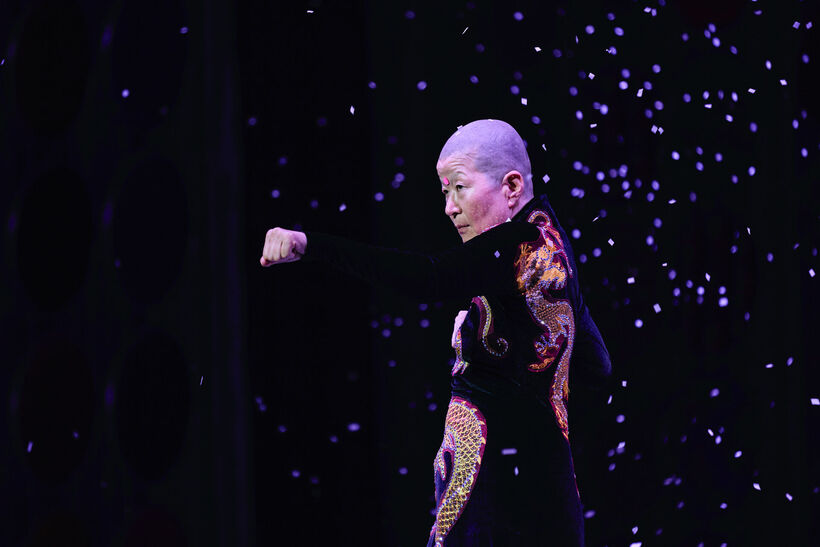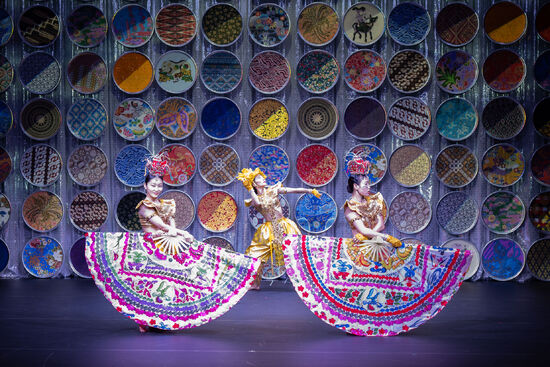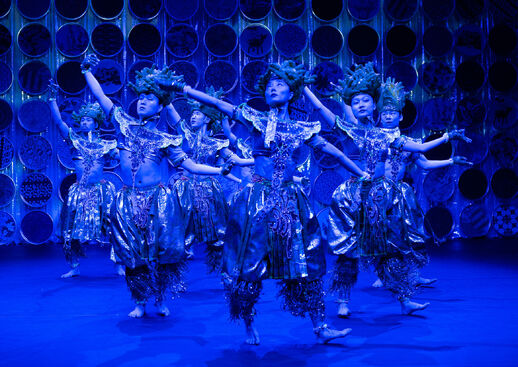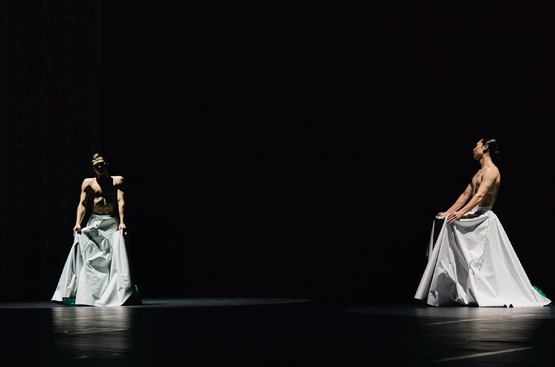Eun-Me Anh makes the intention of Post-Orientalist Express clear before it even begins. As the audience filters in, excerpts from The King and I, Laurence of Arabia, and The Adventures of Tintin: The Blue Lotus are projected onto the stage curtain, visions of snake charmers, magic carpets, and belly dancers firmly rooting us in the Asian continent. Their source, however—Western-produced films whose reductive portrayals of Asian cultures are now widely criticised—signals that over the next 80 minutes, Anh is going to confront these clichés and stereotypes. In the process, she hopes to search for a “new hybrid identity” (according to the programme text) and “to achieve a compelling and realistic representation of contemporary Asian culture.”
In Post-Orientalist Express, South Korean Choreographer Eun-Me Anh Takes Aim at Asian Stereotypes
In the European premiere of her technicolour new work, South Korean choreographer Eun-Me Anh—one of the most important artists of her country, often referred to as the “Pina Bausch of Asia”—confronts Western audiences with their generalisations about the East. A riot of colour, cliché, and camp, the piece not only lays these issues bare—it charts a playful, self-aware path toward reclaiming agency and imagining new forms of empowerment.
And she does exactly that. Reflecting on Anh’s trademark love of bold, camp, colourful aesthetics, over the course of Post-Orientalist Express, dancers burst onto stage wearing an assortment of neon, striped, glittery, tasseled, and bejewelled costumes and masks, some of which obscure and augment their bodies so they appear like otherworldly creatures. Through their mixed movement vocabularies and the multilayered accompaniment—synths combine with Eastern bells, rhythmic drumming and distorted Classical Indian counting—they take us on a Nutcracker-like journey through overlapping cultural clichés.
Serene women recline in boats, Japanese wagasa umbrellas in hand, as they glide across the stage. Elsewhere dancers in Kill Bill-like yellow tracksuits slice their limbs through the air, letting out high-pitched screams in time with their karate chops, and vibrating their torsos as they pound them with nunchuks. There’s also conical hat-wearing performers who pad their feet in quick, articulated steps, wielding long poles as if driving gondolas; bare-chested gymnasts who flip and trick around each other like a synchronised Olympic team; a virile Cossack group bounding in and out of the floor; and dancers running in sweeping pathways with long stretches of fabric streaming from their arms as if part of a Chinese New Year parade.
Anh’s references are far-reaching—they span an entire continent, and the world’s largest at that. Yet rather than betraying a lack of choreographic focus, this broad approach is an intentional reflection of the European tendency to generalise when confronted with cultures we don’t fully understand. (Despite the fact that many of us also get frustrated by the flattening of our own diversity when referred to as simply “Europe” by visitors from the U.S.) Rather than reinforcing them, by presenting said generalizations in such an exaggerated and concentrated way, Anh exposes the extent of their absurdity.
The way the cast performs them also demonstrates the effect such cliches can have on the people they are made about. For the first half of the piece, they move with an emotionless air, eyes gazing straight out into the audience, painfully aware of our presence. It feels like they are performing what they know we want to see, trapped within the images we have constructed of them. “To what extent have they internalized the discourse?” the programme note asks. Watching them, it seems like a great deal.
Their attitudes shift over the course of the show, however, as if they are reclaiming agency over their performances. In a solo performed by Anh herself—while not present throughout, the choreographer often makes cameo appearances in her works—movement starts to ripple through her arms and upper body. Intermittently, she pauses, before sudden impulses propel her back into undulating motion. At times, her eyes close; she senses movement that comes from within, rather than conforming to what has been externally imposed on her body.
Dressed in a high-necked black velvet dress, a golden dragon winding down the front, and dancing beneath a shower of cascading white rose petals, Anh is a picture of serenity and grace. Yet, in the stereotype-breaking spirit of Post-Orientalist Express, she soon shatters this ethereal atmosphere, karate chopping and head-butting through wooden boards presented to her by other dancers. While revisiting a martial arts motif might seem like a return to previous clichés, Anh turns and smiles impishly at the audience before strutting confidently offstage. She’s in on the joke, stereotypes don’t control her, and she can wield them to her advantage whenever she chooses.
Anh’s empowerment is infectious. Before long, the rest of the cast are back on stage for a celebratory finale, forming large phalanxes to perform in a kaleidoscopic amalgamation of steps and gestures we’ve seen throughout the work. Stamping, barrel rolling, flipping, and hip rolling, they flow through phrases with a playful, expressive freedom. Have they finally found the “compelling and realistic representation of contemporary Asian culture” Anh set out to discover? If there’s anything to be learned from Post-Orientalist Express, it’s that audiences on this European tour shouldn’t be the ones to decide.
Written from the European premiere on 15 November 2025 at Berliner Festspiele, Berlin.
Post-Orientalist Express
Choreography: Eun-Me Anh
Sound Design: Young-Gyu Jang
Set Design: Eun-Me Anh
Costumes: Eun-Me Anh
Costume Design and Production: Yunkwan
Props Production: Dongyoung Kim
Lighting Design: Jinyoung Jang
Video Production: Taeseok Lee
Meta-Dramaturgy: Geun-Jun Chungwoo-Michael Lim
Stage Management: Jimyung Kim
Production: Jean-Marie Chabot (Gadja Productions)
Production Assistant: Sungbin Kim
Dancers: Eun-Me Ahn , Hyekyoung Kim , Yongsik Moon , Uiyoung Jung , Deokyeong Kim , Gaon Han , Juwon Son , Hyeonseo Lee , Seyeon Kim
Premiere: May 2, 2025, Sejong Center for the Performing Arts, Seoul




